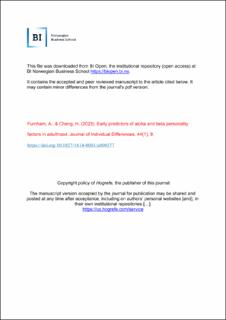Early Predictors of Alpha and Beta Personality Factors in Adulthood
Peer reviewed, Journal article
Accepted version

View/
Date
2022Metadata
Show full item recordCollections
- Scientific articles [2181]
Abstract
This study examined the predictors of two higher factors of personality (Alpha and Beta) using a large nationally representative sample. In total, we had 5,476 participants data on family social status measured at birth, childhood intelligence ability assessed at age 11 years, behavioral problems and leisure activities (sports and parties) at age 16 years, psychological distress at age 23 years, optimism and educational qualifications at age 33 years, occupational prestige at age 42 years, and Big Five personality measured at age 50 years. We combined Big Five scores into Alpha and Beta factors. Correlational analysis showed that childhood intelligence, teenager behavioral problems and leisure activities, psychological distress, optimism, educational qualifications, and occupational prestige were all significant correlates of the Alpha and Beta factors. Structural equation modeling (SEM) showed that childhood intelligence, teenage behavioral problems, education and occupation as well as optimism were the direct predictors of the latent Alpha factor; and that childhood intelligence, education and occupation, psychological distress, and optimism were the direct predictors of the latent Beta factor. Gender was significantly associated with both Alpha and Beta factors. Implications and limitations are acknowledged.
